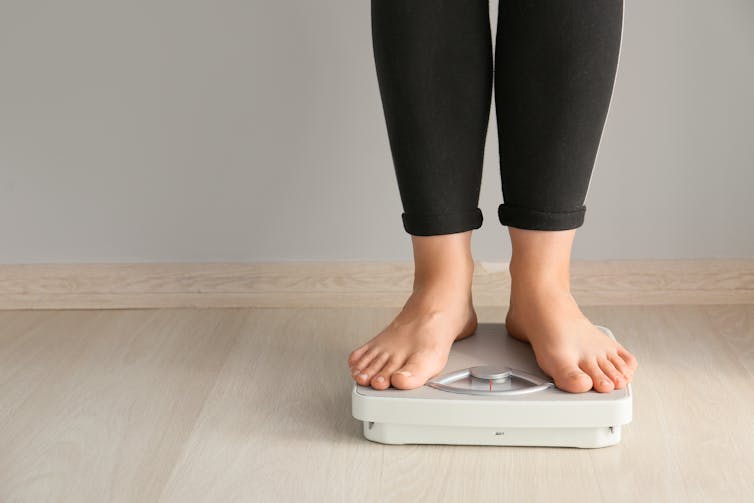
COVID vaccines are very effective, but for some groups they don’t generate as strong an immune response. These groups include older adults and people with weakened immune systems, for example due to cancer or other medical conditions. They tend to already be at heightened risk from COVID.
Likewise, obesity – and its association with several other conditions such as type 2 diabetes, high blood pressure and chronic kidney disease – leads to an increased risk of severe COVID.
The effect of obesity on COVID vaccine effectiveness, however, has not been well understood. But our new study in Nature Medicine finds obesity is linked to faster loss of immunity from COVID vaccines.
We know people with obesity have an impaired immune response to other vaccines including those for influenza, rabies and hepatitis.
COVID vaccines generate antibodies which recognise the spike protein, a protein on the surface of SARS-CoV-2 (the virus that causes COVID) that allows it to attach to and infect our cells. The vaccines also prime immune cells called T cells to protect against severe COVID if we do contract the virus.
Because immunity acquired after two doses wanes in the months afterwards, many countries have elected to administer booster vaccines to maintain immune protection, particularly in vulnerable groups.
Several studies have suggested that following COVID vaccination, antibody levels may be lower in people with obesity than in the general population.
Read more: Severe COVID in young people can mostly be explained by obesity – new study
Earlier in the pandemic, we assembled a team of researchers from the University of Cambridge and the University of Edinburgh to investigate the effect of obesity on vaccine effectiveness over time.
Using a data platform called EAVE II, the University of Edinburgh team, led by Aziz Sheikh, examined real-time healthcare data for 5.4 million people across Scotland. In particular, they looked at hospitalisations and deaths from COVID among 3.5 million adults who had received two vaccine doses (either Pfizer or AstraZeneca).
They found that people with severe obesity, defined as a body mass index (BMI) over 40, had a 76% increased risk of hospitalisation and death from COVID after vaccination compared to those with a BMI in the normal range. The risk was also moderately increased in people who were obese (a BMI between 30 and 40) and those who were underweight (a BMI lower than 18.5).
The risk of severe disease from breakthrough infections after the second vaccine also began to increase more quickly among people with severe obesity (from around ten weeks post-vaccination) and among people with obesity (from around 15 weeks) compared with people of a normal weight (from around 20 weeks).

Investigating further
Our team conducted experiments to characterise the immune response to a third dose, or booster, of mRNA COVID vaccines (those made by Pfizer and Moderna) in people with severe obesity.
We studied 28 people with severe obesity attending Addenbrooke’s Hospital in Cambridge, and measured antibody levels and function as well as the number of immune cells in their blood post-vaccination. We compared the results to those from 41 people of a normal weight.
Although antibody levels were similar in samples from all participants before booster vaccination, the ability of antibodies to work efficiently to fight the virus, known as “neutralisation capacity”, was reduced among people with severe obesity. In 55% of people with severe obesity we either couldn’t detect or quantify neutralisation capacity, compared to 12% of people with normal BMI.
This might mean COVID vaccines induce lower quality antibodies in people with obesity. It’s possible the antibodies are not able to bind to the virus with the same strength as in people of a normal weight.
Read more: How much immunity do we get from a COVID infection? Large study offers new clues
After a booster, antibody function in people with obesity was restored to the same level as those of normal weight. However, using detailed measurements of B cells, which are responsible for antibody production and immune memory, we found that these immune cells developed differently in the first couple of weeks after vaccination in people with obesity.
By repeating measurements of immune responses over time, we could see antibody levels and function declined more rapidly after the third dose in people with severe obesity.
What does this mean?
There were some limitations in both parts of the study. For example, BMI data was only collected once in EAVE II and therefore we cannot exclude changes in BMI over time. Also, the number of people included in our in-depth immunology study was relatively modest.
Nonetheless, immunity from COVID vaccines doesn’t seem to be as robust or long-lasting in people with obesity. With severe obesity affecting 3% of the UK population and 9% of the US population, these findings have important implications.
First, COVID boosters may be particularly important for this group. Our study also highlights the need for more targeted interventions to protect people with obesity from severe COVID.
Evidence shows weight loss of at least 5% can reduce the risk of type 2 diabetes and other metabolic complications of obesity. Interventions that can lead to a sustained reduction in weight (such as lifestyle modification, weight loss drugs, and bariatric surgery) could similarly improve COVID outcomes.
Weight loss may likewise improve vaccine responses, but we need more research to investigate.
Agatha A. van der Klaauw received funding from ZonMW (2007, The Netherlands), Wellcome Trust (2012, UK) and UKRI (2021, UK).
I. Sadaf Farooqi is supported by Wellcome (207462/Z/17/Z), Botnar Fondation, the Bernard Wolfe Health Neuroscience Endowment and a NIHR Senior Investigator Award. I. Sadaf Farooqi has consulted for Eli Lilly, Novo Nordisk and Rhythm Pharmaceuticals on weight loss drugs.
James E. D. Thaventhiran does not work for, consult, own shares in or receive funding from any company or organisation that would benefit from this article, and has disclosed no relevant affiliations beyond their academic appointment.
This article was originally published on The Conversation. Read the original article.







